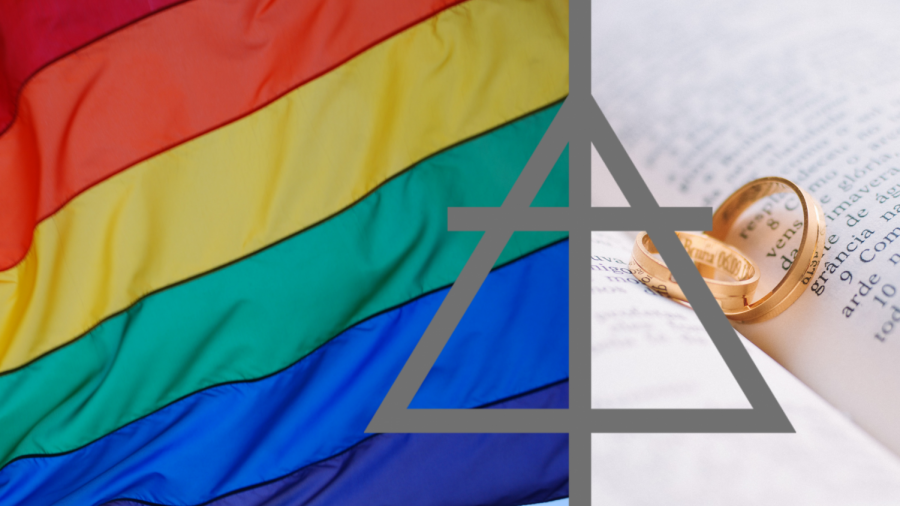What you should know about the new CRC report on sexuality
The Christian Reformed Church’s study committee on sexuality released their hotly anticipated report Thursday, Oct. 29. The report has already generated controversy within the denomination. If you’re confused by the pages of content and significance of the report, you’re not alone. Chimes has broken down the document.
Where does the CRC stand on LGBTQ issues right now?
The denomination’s official stance is that sex is reserved for one man and one woman in marriage. Under this definition, all same-sex sexual activity, polyamory, pre-marital sex, extra-marital sex and divorce are considered sinful. Same-sex orientation, however, is not considered a sin.
This stance has been the subject of much debate within the denomination, especially following the legalization of gay marriage in Canada and the United States. Sherman Street CRC, a congregation near Calvin, brought an overture to Synod in 2011 asking that the denomination appoint a study committee to revisit LGBTQ issues. Synod, the CRC’s annual general assembly of classis leaders, declined, saying that there was not enough new information to warrant another look.
In response, All One Body, an LGBTQ-affirming organization within the CRC, started to meet at Eastern Avenue CRC, another local congregation. Their website states, “All One Body affirms and celebrates with all Christians who unite in committed, monogamous relationships patterned after Christ’s bond with his church.”
Nicholas Wolterstorff, a prominent philosopher in the denomination, went public with his support of same-sex marriage in 2016. “The Banner” hosts regular debates regarding LGBTQ issues in its opinion section. This summer, Neland Avenue CRC appointed a deacon who is in a same-sex marriage, a first for the denomination.
Classis Grand Rapids East released its own report in 2016 that concluded that Christians who held to traditional and affirming positions were both concerned with compassion for LGBTQ persons and adherence to scriptural sexual ethics. It held that the denomination could agree to disagree on the topic, much like how it does with the issue of women in church office.
What is the CRC’s report about?
The recent committee report is intended to be a comprehensive look at human sexuality through a Christian Reformed lens. At Synod 2016, the assembly appointed the study committee to express a “foundation-laying biblical theology” regarding sexuality in this document.
Topics covered include pornography, gender identity, homosexuality, sexual desire, premarital sex, polyamory and divorce; however, the mandate for the study committee asked that they give special attention to what the Bible says about gender and sexuality.
Essentially, the study committee was tasked with evaluating arguments for LGBTQ affirmation and deciding whether or not the CRC should consider these arguments. Additionally, the report needed to investigate whether its conclusions warranted declaring a status confessionis, elevating the church teaching to the authority of its confessions.
Their conclusion: the denomination’s current stance on sexuality is already confessional, and Synod 2021 should vote to affirm that.
If the CRC already holds these positions on sexuality, why is this report such a big deal?
The crux of this report is that current CRC teaching already merits confessional status. The CRC’s confessions, the Heidelberg Catechism, Canons of Dort and the Belgic Confession, differentiate the denomination from other branches of Christianity. Only the Bible and the ecumenical creeds rank above the confessions in authority.
In short, this report states that disagreeing with what the CRC says about sexuality is a violation of the denomination’s confessions. Stances on LGBTQ issues are then as fundamental to denominational beliefs as issues like infant baptism and the doctrine of providence.
The study committee’s justification for their decision lies in the 108th question and answer of the Heidelberg Catechism, which explains what is meant by the seventh commandment, “You shall not commit adultery.”
It states that God condemns all “unchastity.” The report in question states, “By the word ‘unchastity’ the catechism intends to encompass all sexual immorality, including homosexual activity.”
Despite the high stakes of confessional status, the report claims there is yet space for debate. “Even if a teaching has confessional status, that does not mean there is no room for disagreement within the bounds of that teaching. In addition, the church sometimes allows for pastoral accommodations,” it states, then citing exceptions made for infant baptisms as one example.
Neland Avenue’s letter to congregants explaining the decision to appoint a deacon in a same-sex marriage explains why the distinction of status confessionis matters. The church’s council refers to the Synod 1973, 2002 and 2016’s decisions on LGBTQ issues as pastoral advice, not as a confessional matter. Disagreeing with pastoral advice, the letter says, does not cross any lines of orthodoxy; disagreeing with confessions would.
Who was on the committee?
The study committee’s mandate stated that twelve individuals from the denomination with diverse backgrounds must make up the committee. The group was required to include “an African American pastor, a Hispanic pastor, a Korean pastor, three faculty members from Calvin Theological Seminary, a same-sex attracted person, a chaplain, a philosopher, and a social scientist.”
Additionally, the individuals who served on the study committee were required to “adhere to the CRC’s biblical view on marriage and same-sex relationships.”
What does this mean for Calvin?
The report will mostly affect professors, who must sign a synodically approved “Covenant for Faculty Members” pledging that their teaching, speaking and writing is in harmony with the confessions. In an email to Chimes, Provost Cheryl Brandsen said, “To say what it would mean for Calvin faculty is premature, and I would not want to speculate.”
The provost noted that the professional status committee is just beginning to discuss what the report means for Calvin faculty.
After the report was posted, numerous professors expressed their disagreement and concerns on social media and in private faculty forums.
What are the next steps?
Synod 2021 meets from June 11 to 17 of next year. The report asked that Synod vote to declare that the CRC’s current teachings around sexuality already have confessional status. It also asked that Mary-Lee Bouma, Jim Vanderwoerd and Jeff Weima, three members of the study committee, be granted the ability to speak before Synod.
According to the report, all responses must be sent as overtures or communications to Synod 2021. To be included on Synod’s agenda, the sender’s church council and classis must process their response before the Synodical Services Office can receive them. The deadline is March 15, 2021.











rpsabq • Nov 8, 2023 at 2:14 pm
It’s obvious the report is flawed by the definitions they came up with:
Homosexuality: a condition of personal identity in which a person is sexually oriented toward persons of the same sex.
Homosexualism: explicit and overt homosexual practice.
Homosexual: a person who has erotic attractions for members of the same sex and who may or may not actually engage in homosexualism.
If these definitions were accurate, then they should be true for heterosexuality as well, right? It’s when you apply the same definitions to heterosexuality that the intense, negative bias comes through. Would a heterosexual be descibed as a “person who has erotic attractions for members of the opposite sex and who may or may not actually engage in heterosexualism”?
Of course not. If we come to the table with the assumption that homosexuality is perverted, weird and has no holy value then of course it’s wrong. But what the Church refuses to do is to apply the same holy principles to homosexual marriage as it has traditionally done with heterosexual marriages.
Why can’t the church imagine two people of the same sex wanting to come together before God and the Church committed to one another in a holy monogamous relationship; seeking God in the reflection of our “lover,” one flesh, one mind before God.
Why is that so impossible to understand?
Becky Togtman • Mar 20, 2021 at 1:48 pm
The study committee for the Christian Reformed Church did their job and made their conclusions for our church. The people of the church assume that the professors at Calvin, a school based in Christian Reformed theology, would adhere to the conclusions made by the church. It is of extreme disappointment to know that so many of them do not The ideas put out on their social media pages, the books that are being written, show that many of them are pushing our children to embrace ideas that we as a church do not. This should not be tolerated. The church is very clear that we should love ALL people with the love of Christ, without accepting and embracing behavior contrary to scripture. From information, articles and books put out by some Calvin professors, they are embracing the behavior. It is hard to love unconditionally while not accepting a behavior. But that is what we need to work on with the upcoming generation, not a free-for-all of accepting all lifestyles, ideas, and behavior. I will never promote Calvin, my alma mater, until all professors follow Church theology or until they are gone.
Andrew Hoeksema • Jan 2, 2021 at 7:50 pm
John^, you are free to agree with the report and you are free to wish church leaders agree with your position. Giving the denomination’s current position confessional status, however, will not bring the issue to an end or make it go away. LGBTQ Christians are our brothers and sisters in Christ. We are to love with the love of Christ even when, maybe especially when we don’t understand. To want “the issue” to end is to want them to go away. Sadly, the result of agree or go away culture of many CRC congregations and institutions has led many in the Millennial generation and younger (40 and under) to go away, myself included. When there is no room left for spirited conversation across differences, anyone who feels in the minority because of sexuality or differences of opinion then leaves and the church is poorer for its agreement, instead of pursuing unity with diversity. I think this will be a sad day for the CRC to make the position on human sexuality confessional status, if Synod so decides.
John Hettinga • Nov 17, 2020 at 6:50 am
I agree with the report. I would also like to have Sunday school teachers, youth leaders, council members, bible study leaders, church librarians etc sign the same form as Calvin facility members. Otherwise this issue will be never ending in the crc.